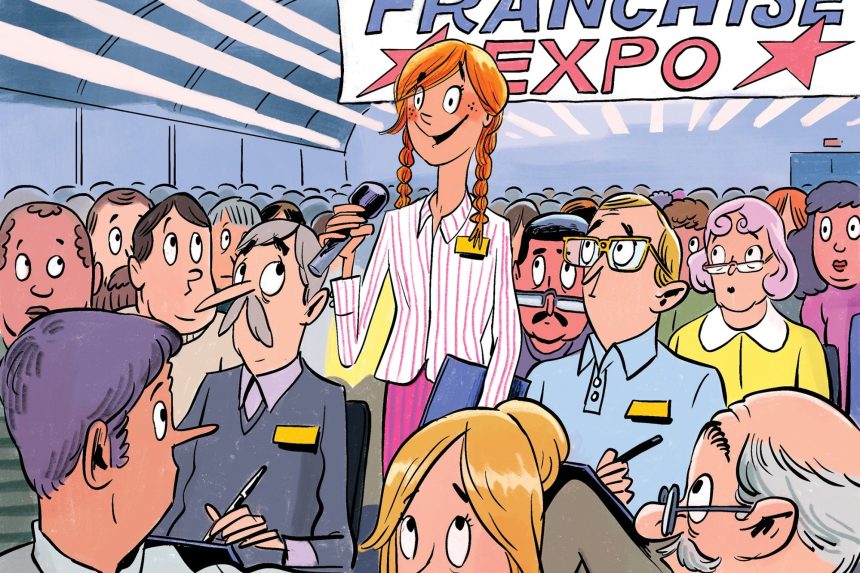Picture it: An aspiring franchisee sits in an audience, listening to a franchise CEO speak. Now, a question: How old are those people?
A generation ago, the answer would have been easy: The aspiring franchisee is a late-career corporate professional looking for a change, as is the audience, and the CEO is a near-retirement leader who’s spent a lifetime in franchising. That was the stereotype, anyway, and it often proved to be true.
But by the time Katie Webb wanted to be a franchisee, things looked different. Four years ago, when she was in her early 30s, she attended a Stretch Zone discovery day. That’s when she heard from Stretch Zone CEO Tony Zaccario, who was in his late 20s. “Every time I’d write down a question to ask, it would get answered,” Webb remembers. “Tony was a big part of it. Him being young and energetic and so forward-thinking — he assumed the questions you would have, and he had the answers for you.”
Fast-forward to today, and Webb is a multi-unit owner with five Stretch Zone locations in Florida. “I would say a good 50% of our franchisees are below 40,” says Zaccario, “and you probably have around 10% in the age-30 range.” Some are even in their 20s. And franchising at large is starting to look different.
Related: Think You’re Too Young to Own a Franchise? Think Again.
Traditionally, becoming a franchisee was considered a “second act” business venture, but lately, certain types of franchises — those with lower fees and simpler operation parameters — are seeing an increasing number of young applicants. These “first act” entrepreneurs are being exposed to the business model earlier in life, with colleges and universities offering franchising certificates and specialized programs in franchise management. These burgeoning franchisees have also come of age in an era that included the Great Recession and pandemic layoffs, contributing to the belief among nearly 20% of Gen Z that companies have no loyalty to employees anymore. Their instinct is to carve out their own path: 53% of skilled Gen Z knowledge workers are already freelancing, according to a report from Upwork, and among Gen Zers, 70% of respondents to a Fiverr global study are either actively freelancing or plan to do so in the future.
“The days of people working for major corporations and waiting years and years for an opportunity for a promotion — I don’t think that is attractive to a lot of these franchisees,” Zaccario says. “When you are able to deliver a simple business model that doesn’t require a lot of money or experience, it falls into what they’re looking for.”
Meanwhile, the franchise industry is evolving to make it more accessible to young people. This is according to Daniel Hayes at Hundred Acre Consulting, which has advised entrepreneurs and nonprofits since 2008, and works with more than 800 franchises in 78 industries. Not only are there more low-cost franchises than ever before, he says, but it’s also gotten easier to launch new franchise concepts. “Years ago, you’d have to have several actual businesses working, maybe a little longitudinal information, maybe two or three years of net revenue generation,” he says. “Now, if the business model makes sense and it can be taught and duplicated and be put into a territory with the demographics to help it work, you don’t really need to have five or six franchises operating to say it works.”
The sea change isn’t complete; people under 35 still only own close to 8% of franchises. “But I’m a big believer in Moore’s law — technology doubles itself every two years — and the franchise industry is advancing and doubling,” he says. “So I wouldn’t think it’s going to take too long.”
Related: How Franchises Can (and Should) Attract Millennial and Gen Z Franchisees
Where are all these young, aspiring franchisees coming from? Here’s one place: boot camps.
In 2018, Hayes attended an entrepreneurial boot camp that helped MBA grads go into franchising. It taught a very specific strategy: Buy three or so licenses from the same franchise to get a price break, and then build toward selling them in two or three years. “You’re creating income for yourself for that period of time, and at the end of about seven years, you’ve tripled or quadrupled your initial investment,” Hayes says. “We’re talking service, usually, because these folks don’t have a whole lot of money.”
Some younger franchisees get started with family money, he says, but the majority go for Small Business Administration approval and financing with a credit score over 690 and one-third of the loan amount. “A lot of franchises today are under $150,000, so you can do SBA express loans,” he says. “It’s easier for people who don’t have a lot of money to step into one of these things.”
Frios Gourmet Pops is that kind of franchisor. A modern take on the classic ice cream truck, Frios sells gourmet pops from tie-dye-wrapped vans, trailers, and carts. The brand had 18 locations when CEO Cliff Kennedy bought it in December 2018, and now has more than 110, with an increasing number of franchisees younger than 30. “I think it’s in this crazy world that they’ve seen their parents lose their job or whatever, and they want to control their own destiny,” Kennedy says. It doesn’t hurt that a franchise unit costs $37,500 (with total initial investment from $59,548 to $101,417), and that Frios pops are easily Instagrammable — enabling these new owners to use their social media savvy to grow their business.
Kennedy, who is 42, says Gen Z’s hyperfocus on self-reliance is distinct from what he sees in Millennials, Gen X, and Baby Boomers. “It’s different from somebody coming out of corporate and it’s their first job that’s not a W-2,” Kennedy says. “This generation is less apprehensive about the future. They’re ‘full steam ahead, let’s get multiple territories.'”
And they can be serious earners, according to Thomas Scott, founder and CEO of Home Run Franchises, whose brands include Up Closets and The Lighting Squad. While younger owners make up only about 30% of his franchisees, they’re turning out to be about 60% of the top performers.
“If they’re in college, the traditional career path of Gen X and Baby Boomers, that’s a pipe dream,” Scott says. “They sit around and go, ‘Who the hell thought that up? Why would I want to spend 40 hours in a cubicle farm paying my dues? I’ve had access to YouTube since I was a kid, and I know that if you want to do anything in life, you start a business.'”
Related: I Wish I Received This Advice as a Young Entrepreneur
Image Credit: Zohar Lazar
There’s another reason that young people are interested in franchising: Entrepreneurship has become a big part of online influencer culture.
In 2023, a survey by Junior Achievement USA and EY revealed that 76% of teens would be likely to consider becoming an entrepreneur, with their top inspirations including social media influencers and successful businesspeople they see in the media.
Micro-influencers — noncelebrities with 10,000 to 100,000 followers — have a particular impact on Gen Z, according to Jay Sinha, an associate professor at Temple University’s Fox School of Business, whose recent study published in the Journal of Brand Strategy investigated the characteristics that make Generation Z a different type of consumer.
“They are a new consumer in the U.S. market and are very different from past generations,” Sinha says. “The traditional ways to appeal to consumers are not as effective with this audience, which is why it’s imperative that companies adapt.”
Past research has shown that Gen Z’s peers, not authority figures, are most likely to get their attention. This generation spends significant time online, seeking virtual connections and virtual friendships, and especially values authenticity — which is where micro-influencers excel.
“Generation Z finds micro-influencers to be more credible,” Sinha says. “Micro-influencers communicate and engage with them on a very personal level, which heightens engagement.”
Related: 15 Young Founders Rethinking Everything From Artificial Intelligence to Carbon Removal, Sustainable Fashion to…Pizza!
But of course, if a franchise wants to attract young franchisees, it can’t just start paying some influencers. A more fundamental shift is required. At Stretch Zone, Zaccario says, they’ve had to change the way the brand communicates — like making training materials more fast-paced and putting new information into short-form videos.
“When we tracked it, people’s attention span —the ability to finish even a 30-minute video — was dropping steadily over time,” Zaccario says. Anything more than a few minutes, he says, is not optimal in a world where younger people expect short, effective, immediately relevant content.
Frios Gourmet Pops has seen another interesting shift: Although Gen Z franchisees are fluent in social media marketing, they need a lot of training to market outside those channels — such as learning who to call at a country club, or who to ask for when contacting a school. “We’re training them on how to connect with people,” Kennedy says. “Like, ‘Here’s how that conversation is going to flow. Here’s an email template for a school, or a little bit different language for a business. Here’s a sample LinkedIn message.'”
But even as it trains franchisees in more traditional outreach methods, Frios Gourmet Pops makes sure to encourage Gen Z owners to express themselves in ways that feel natural, realizing how beneficial that kind of energy is for the whole company. Sometimes young franchisees ask to include the CEO in whatever they come up with, and Kennedy is game.
“One of them said, ‘Hey, Cliff, put on these glasses and do this,'” he recalls. “Then she said, ‘Come look at my Instagram.’ It was all these dances and things. She was doing it all. They get a following and people get excited about it. That’s where they interact.”
This enthusiasm even flows upward to Kennedy’s older franchisees. “It’s a breath of fresh air,” he says. “The younger franchisees post each other’s things from online. The older generation, once they see how many likes and comments these posts are getting, say, ‘Wow, this is how I want things to be for my business too.'”
Embracing that mentality ultimately translates into real-world marketing ideas, he says: “They literally get custom shirts that they make themselves. They’re getting sweaters and T-shirts that personify who they are. That’s where the younger generation is. They’re happiness-hustlers.”
Related: Gen Z Is Redefining the Workplace — and Companies Must Adapt or Face Losing Talent
Here’s something that doesn’t change across generations: New franchisees want to make money. But Gen Z thinks bigger than previous generations — or, seen another way, Gen Z carries more financial anxiety and is seeking more stability.
Empower recently found that, although most Americans say a salary of $270,000 indicates financial success, Gen Z’s expectations are much higher. To be comfortable, they want to make nearly $600,000 a year. Meanwhile, their reality falls far short of that, with the median income for full-time wage and salary workers ages 25 to 34 projected to be about $61,500 in 2025. When you first start franchising, that $600,000 goal may be a stretch, but it’s totally possible to be 24 years old, buy a pet-walking or a heat-pump-cleaning location, and make $200,000 a year.
“The business may generate $300,000 or $400,000 a year, and you’ll be doing 50% or 70% of that in net, depending on how many people you hire to help you,” Hayes says. “Even if you hate it after five years, you sell it. What’s the difference? You’re 29.”
Gen Z doesn’t think about that kind of plan as a big risk, Hayes adds. Their mentality toward taking chances is far different from Baby Boomers and Gen X.
“The W-2 world does not hold the kind of draw and mythical allure for that generation that the corner office did for us,” he says. “It seems much easier for them to do it than it was for us.”
Related: Why Gen Z Is Ditching the Corner Office Dream — and How Businesses Can Adapt
Kennedy, the Frios CEO, also says he sees this difference play out in the way his Gen Z franchisees think, from the instant they sign on the dotted line. “We have a lot of first-time business owners, and at that last moment before they sign on, they think, Oh my goodness, I’m betting on myself,” he says. “The younger generation has never felt that. They’re like, ‘Let’s go. I get to make all the calls? Let’s do this.'”
To Webb, it all comes down to another word that young people love: balance. She wants to make money, but also enjoy her life outside of work. “I’m coming off that hustle mentality,” she says, now five years shy of her 40th birthday. “When I was 20, it was work all the time, hustle, hustle, hustle. But you have to know: When is the stopping point where I’ve worked really hard and set things up so they can run themselves?”
Join top CEOs, founders and operators at the Level Up conference to unlock strategies for scaling your business, boosting revenue and building sustainable success.
Read the full article here









